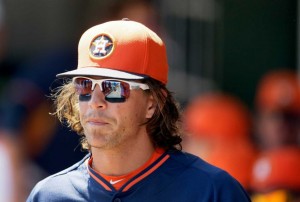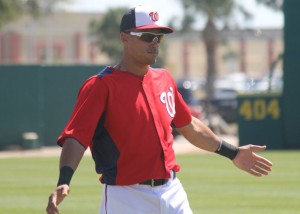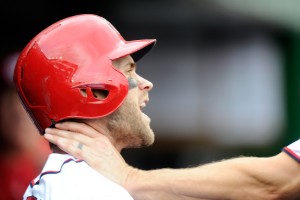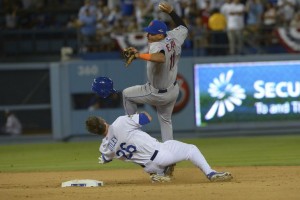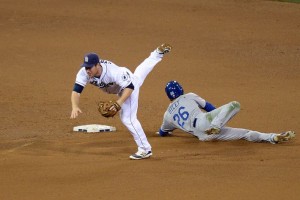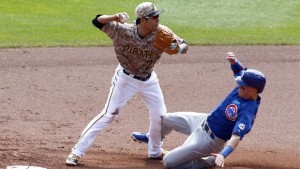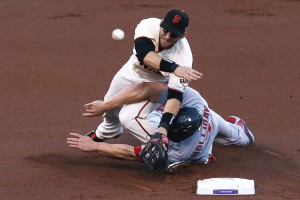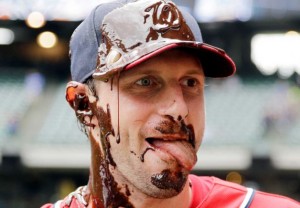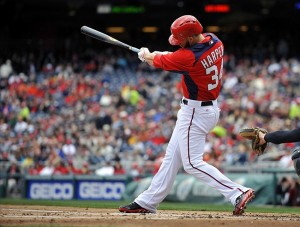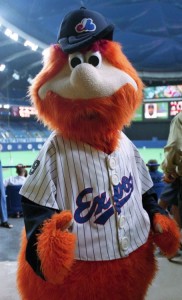
Don’t think we’re seeing Youppi’s return anytime soon. Jpg via Youppi’s tumblr page (yes it exists).
Rob Manfred was caught on mike talking about expansion at this year’s all-star game. He reminded us that Montreal drew 91,000 fans to two exhibition games prior to this season’s start.
Before we even talk about all the other roadblocks to expansion in the current MLB landscape (RSN deals, geographical ownership issues, the lack of actual viable cities, the lack of the cascading downstream need for an additional *twelve* minor league teams/twelve appropriate minor league cities to support two more MLB teams, etc), lets talk about Montreal as a baseball host city. Because we have plenty of evidence already telling us whether that city really can host professional baseball.
Here’s a table showing Attendance and ranks within the NL for the Franchise:
| Year |
Tm |
Lg |
W |
L |
W-L% |
Finish |
Attendance |
Rank in NL |
Capacity |
Attendance as % of Capacity |
| 2015 |
Washington Nationals |
NL East |
48 |
39 |
0.552 |
1st of 5 |
|
|
|
|
| 2014 |
Washington Nationals |
NL East |
96 |
66 |
0.593 |
1st of 5 |
2,579,389 |
7th of 15 |
41,418 |
76.89% |
| 2013 |
Washington Nationals |
NL East |
86 |
76 |
0.531 |
2nd of 5 |
2,652,422 |
6th of 15 |
41,418 |
79.06% |
| 2012 |
Washington Nationals |
NL East |
98 |
64 |
0.605 |
1st of 5 |
2,370,794 |
9th of 16 |
41,418 |
70.67% |
| 2011 |
Washington Nationals |
NL East |
80 |
81 |
0.497 |
3rd of 5 |
1,940,478 |
14th of 16 |
41,418 |
58.20% |
| 2010 |
Washington Nationals |
NL East |
69 |
93 |
0.426 |
5th of 5 |
1,828,066 |
14th of 16 |
41,418 |
54.49% |
| 2009 |
Washington Nationals |
NL East |
59 |
103 |
0.364 |
5th of 5 |
1,817,226 |
13th of 16 |
41,418 |
54.17% |
| 2008 |
Washington Nationals |
NL East |
59 |
102 |
0.366 |
5th of 5 |
2,320,400 |
13th of 16 |
41,418 |
69.59% |
| 2007 |
Washington Nationals |
NL East |
73 |
89 |
0.451 |
4th of 5 |
1,943,812 |
14th of 16 |
45,596 |
52.63% |
| 2006 |
Washington Nationals |
NL East |
71 |
91 |
0.438 |
5th of 5 |
2,153,056 |
11th of 16 |
45,596 |
58.30% |
| 2005 |
Washington Nationals |
NL East |
81 |
81 |
0.5 |
5th of 5 |
2,731,993 |
8th of 16 |
45,596 |
73.97% |
| 2004 |
Montreal Expos |
NL East |
67 |
95 |
0.414 |
5th of 5 |
749,550 |
16th of 16 |
45,757/18,264 |
24.17% |
| 2003 |
Montreal Expos |
NL East |
83 |
79 |
0.512 |
4th of 5 |
1,025,639 |
16th of 16 |
45,757/18,264 |
33.07% |
| 2002 |
Montreal Expos |
NL East |
83 |
79 |
0.512 |
2nd of 5 |
812,045 |
16th of 16 |
45,757 |
21.91% |
| 2001 |
Montreal Expos |
NL East |
68 |
94 |
0.42 |
5th of 5 |
642,745 |
16th of 16 |
45,757 |
17.34% |
| 2000 |
Montreal Expos |
NL East |
67 |
95 |
0.414 |
4th of 5 |
926,272 |
16th of 16 |
45,757 |
24.99% |
| 1999 |
Montreal Expos |
NL East |
68 |
94 |
0.42 |
4th of 5 |
773,277 |
16th of 16 |
45,757 |
20.86% |
| 1998 |
Montreal Expos |
NL East |
65 |
97 |
0.401 |
4th of 5 |
914,909 |
16th of 16 |
45,757 |
24.69% |
| 1997 |
Montreal Expos |
NL East |
78 |
84 |
0.481 |
4th of 5 |
1,497,609 |
13th of 14 |
45,757 |
40.41% |
| 1996 |
Montreal Expos |
NL East |
88 |
74 |
0.543 |
2nd of 5 |
1,616,709 |
11th of 14 |
45,757 |
43.62% |
| 1995 |
Montreal Expos |
NL East |
66 |
78 |
0.458 |
5th of 5 |
1,309,618 |
10th of 14 |
45,757 |
39.75% |
| 1994 |
Montreal Expos |
NL East |
74 |
40 |
0.649 |
1st of 5 |
1,276,250 |
11th of 14 |
45,757 |
48.93% |
| 1993 |
Montreal Expos |
NL East |
94 |
68 |
0.58 |
2nd of 7 |
1,641,437 |
13th of 14 |
45,757 |
44.29% |
| 1992 |
Montreal Expos |
NL East |
87 |
75 |
0.537 |
2nd of 6 |
1,669,127 |
10th of 12 |
45,757 |
45.03% |
| 1991 |
Montreal Expos |
NL East |
71 |
90 |
0.441 |
6th of 6 |
934,742 |
12th of 12 |
45,757 |
25.38% |
| 1990 |
Montreal Expos |
NL East |
85 |
77 |
0.525 |
3rd of 6 |
1,373,087 |
10th of 12 |
45,757 |
37.05% |
| 1989 |
Montreal Expos |
NL East |
81 |
81 |
0.5 |
4th of 6 |
1,783,533 |
10th of 12 |
45,757 |
48.12% |
| 1988 |
Montreal Expos |
NL East |
81 |
81 |
0.5 |
3rd of 6 |
1,478,659 |
11th of 12 |
45,757 |
39.90% |
| 1987 |
Montreal Expos |
NL East |
91 |
71 |
0.562 |
3rd of 6 |
1,850,324 |
9th of 12 |
45,757 |
49.92% |
| 1986 |
Montreal Expos |
NL East |
78 |
83 |
0.484 |
4th of 6 |
1,128,981 |
11th of 12 |
45,757 |
30.65% |
| 1985 |
Montreal Expos |
NL East |
84 |
77 |
0.522 |
3rd of 6 |
1,502,494 |
8th of 12 |
45,757 |
40.79% |
| 1984 |
Montreal Expos |
NL East |
78 |
83 |
0.484 |
5th of 6 |
1,606,531 |
8th of 12 |
45,757 |
43.61% |
| 1983 |
Montreal Expos |
NL East |
82 |
80 |
0.506 |
3rd of 6 |
2,320,651 |
3rd of 12 |
45,757 |
62.61% |
| 1982 |
Montreal Expos |
NL East |
86 |
76 |
0.531 |
3rd of 6 |
2,318,292 |
3rd of 12 |
45,757 |
62.55% |
| 1981 |
Montreal Expos |
NL East |
60 |
48 |
0.556 |
2nd of 6 |
1,534,564 |
3rd of 12 |
45,757 |
62.11% |
| 1980 |
Montreal Expos |
NL East |
90 |
72 |
0.556 |
2nd of 6 |
2,208,175 |
4th of 12 |
45,757 |
59.58% |
| 1979 |
Montreal Expos |
NL East |
95 |
65 |
0.594 |
2nd of 6 |
2,102,173 |
4th of 12 |
45,757 |
57.43% |
| 1978 |
Montreal Expos |
NL East |
76 |
86 |
0.469 |
4th of 6 |
1,427,007 |
7th of 12 |
45,757 |
38.50% |
| 1977 |
Montreal Expos |
NL East |
75 |
87 |
0.463 |
5th of 6 |
1,433,757 |
6th of 12 |
45,757 |
38.68% |
| 1976 |
Montreal Expos |
NL East |
55 |
107 |
0.34 |
6th of 6 |
646,704 |
11th of 12 |
28,456 |
28.06% |
| 1975 |
Montreal Expos |
NL East |
75 |
87 |
0.463 |
5th of 6 |
908,292 |
9th of 12 |
28,456 |
39.41% |
| 1974 |
Montreal Expos |
NL East |
79 |
82 |
0.491 |
4th of 6 |
1,019,134 |
9th of 12 |
28,456 |
44.49% |
| 1973 |
Montreal Expos |
NL East |
79 |
83 |
0.488 |
4th of 6 |
1,246,863 |
9th of 12 |
28,456 |
54.10% |
| 1972 |
Montreal Expos |
NL East |
70 |
86 |
0.449 |
5th of 6 |
1,142,145 |
9th of 12 |
28,456 |
51.46% |
| 1971 |
Montreal Expos |
NL East |
71 |
90 |
0.441 |
5th of 6 |
1,290,963 |
8th of 12 |
28,456 |
56.36% |
| 1970 |
Montreal Expos |
NL East |
73 |
89 |
0.451 |
6th of 6 |
1,424,683 |
6th of 12 |
28,456 |
61.81% |
| 1969 |
Montreal Expos |
NL East |
52 |
110 |
0.321 |
6th of 6 |
1,212,608 |
7th of 12 |
28,456 |
52.61% |
Some salient points in time for context (lots of the history stuff is from the wikipedia page for the Expos):
- From 1969 to 1976, Montreal played in “Parc Jerry,” with a capacity of just 28,456 for baseball. For the first few seasons, the team drew decently, averaging nearly 50% capacity. They bottomed out in 1976, going from a 75 win team to a 55 win team.
- In 1977, the team rebounded in both performance and attendance timed with the move to Olympic Stadium; their attendance more than doubled from 1976 to 1977. From 1978 to 1983, the team was successful on the field and in the stands, routinely placing 3rd or 4th in the league in attendance and placing 2nd or 3rd place in the division. This also included the Montreal franchise’s sole playoff appearance, a 3-2 NLDS loss in 1981.
- Suddenly after 1983, fans stopped showing up and the team stayed mediocre; they went from 3rd or 4th in the league in attendance to 8th at best, 11th out of 12 at worst.
- In 1991, the team was sold to a new ownership group, and a new wave of players made the Expos very competitive very fast (94 wins in 1993). However, fans remained ambivalent; even after the 1993 season as the team sat in 1st place for all of 1994 (the season eventually cancelled), attendance went from 44% of capacity to 48% of capacity. After the players strike, ownership and fan interest began to dwindle.
- Jeffrey Loria acquired the team in 1999; he failed to get media deals done for the 2000 season, failed to negotiate a new stadium deal, and attendance and fan interest showed: in 1998 the team was dead last in attendance and never left last place of the NL.
- Baseball attempted to contract Montreal (and Minnesota) in 2001, further adding insult to injury for the remaining Montreal fans.
- In 2002, MLB negotiated the 3-way transaction of Boston, Florida and Montreal, leaving the Expos as a ward of MLB. From 2002 to 2004, the franchise was plundered of its staff, its infrastructure, and its willingness to compete. Furthermore, to “combat low attendance” the team played a quarter of its “home games” in Puerto Rico at a stadium a fraction of the capacity of Montreal’s stadium.
- In their final seasons in Montreal, the Expos were averaging just 17-20% stadium capacity (not counting the two years traveling to San Juan). By way of comparison, the Nats first season was at 73% and their last three have not dipped below the 70% capacity marker.
Some quick summary points:
- The Expos absolute best cumulative attendance season was 1983; the Nats have already drawn more than that on four different occasions.
- The Nats worst attendance season (2009), was still better than 31 of Montreal’s 36 seasons.
- The Nats already have the 5 best attendance as a % of capacity seasons.
- Montreal was dead last in NL attendance for their last 7 seasons in Canada. You have to go back another 14 seasons before you even find a time when they were in the upper half of the league of attendance.
Montreal was asking for a new stadium as early as 1999-2000, and ran into roadblocks to get public funding in the amount of $150-$200M. Now new stadiums routinely cost 4-5 times that. Why would anyone think that Montreal would finance something now?
So, again, considering the known attendance and stadium issues, and not even addressing the RSN and currency issues, why again does anyone think that Montreal is a viable city for Baseball right now? Yes its a large city (it’d be ranked somewhere in the 10-15th largest city range if it acquired baseball), and yes its a “wealthier” city since its Canada and it houses their seat of government. But, they *had a team* for 30+ years and didn’t support it, refused politically to build the infrastructure to keep it, and had no local ownership interested in keeping it.
Sometimes I hear about other international expansion sites. Puerto Rico? Mexico City?? Do people not understand the financial needs to support a professional baseball team? You need *wealthy* cities, not places where the median income is a fraction of what it is in the USA (by some measures, Puerto Rico’s is about 30% of the US and Mexico is just 10-15% of the US).
Portland? San Antonio? Charlotte? Virginia Beach? All nice mid-sized American cities, in some cases already hosting AA or AAA teams. All *smaller* than some of the smallest markets already hosting MLB teams and struggling financially (places like Milwaukee, Kansas City, Pittsburgh, Tampa, etc). So I’m not entirely sure how these are great expansion alternatives. The last two times baseball expanded, it was to major, growing cities that were mostly deserving (Denver, Miami, Phoenix and Tampa).
I dunno; every time I hear about expansion in baseball I laugh. We still havn’t even come close to figuring out the most recent franchise relocation issues (aka, Washington-Baltimore’s RSN mess) and Oakland & San Francisco can’t agree on who “owns” a city that’s basically equidistantly far away from both stadiums (San Jose). Now we want to shoe-horn in two more franchises onto a landscape map that’s 100% spoken for?
The reality of the situation is this: the two places it makes the most sense to put an additional team are the two largest cities in the land. New York and Los Angeles. Stick a team in Brooklyn and in Riverside and carve up the massive markets in those two cities. And it’ll never, ever happen.
